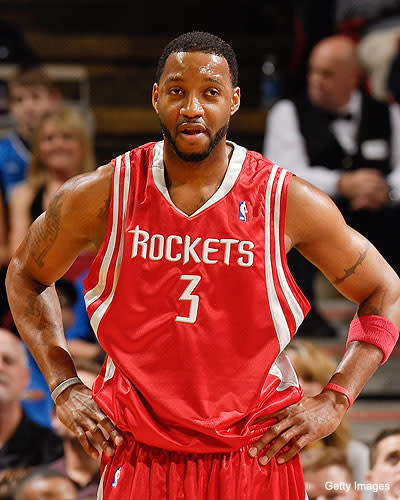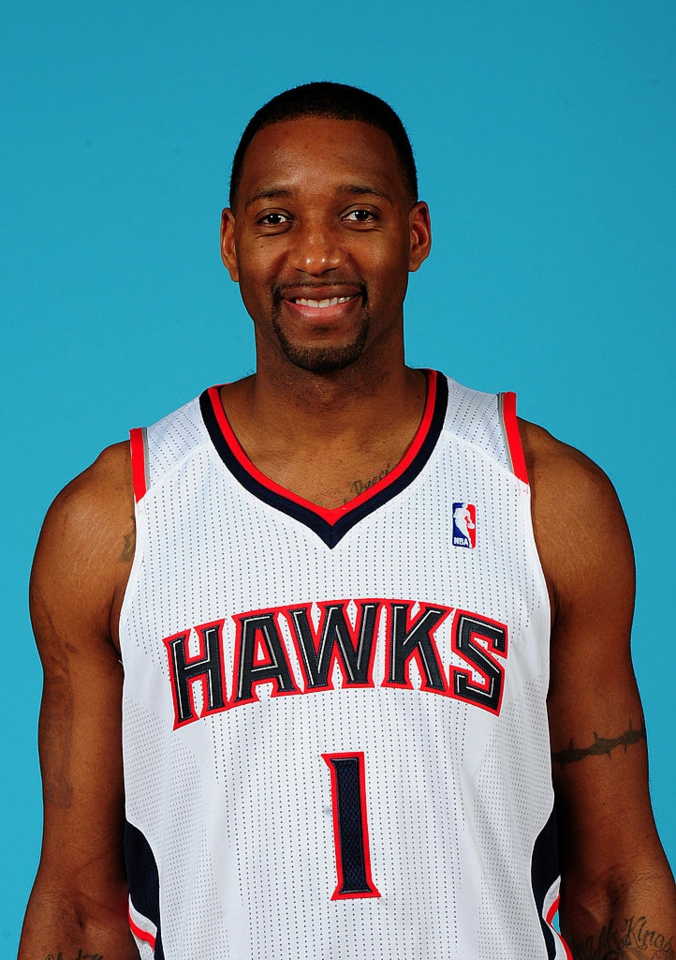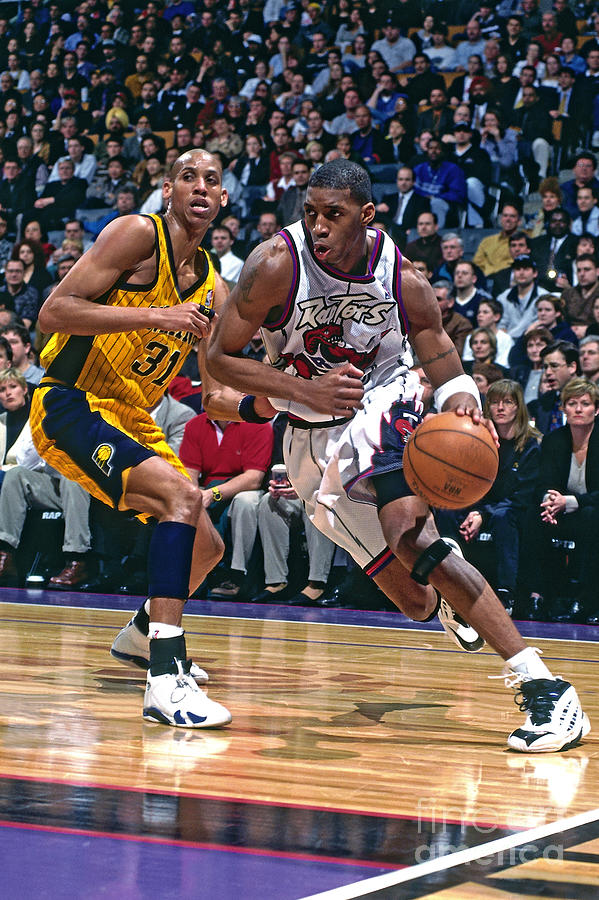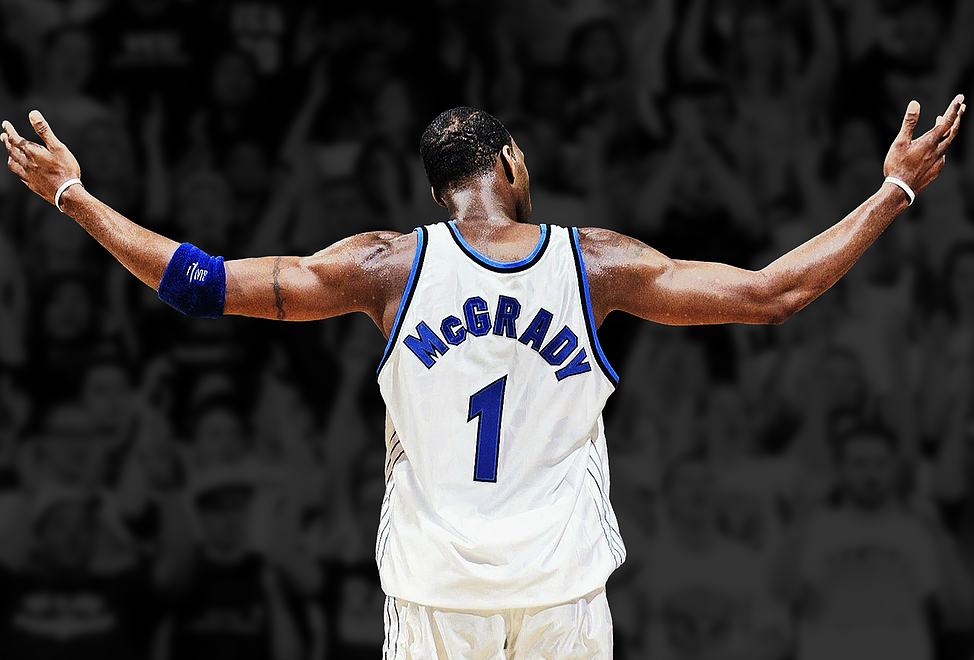Tracy McGrady (Part 2)
Tracy McGrady (Part 2)

After the Toronto Raptors' disappointing first-round exit in the playoffs, Tracy McGrady became a free agent and signed with the Orlando Magic on August 3, 2000. This move was facilitated through a sign-and-trade deal, with the Magic sending a future 2005 1st round draft pick (which ultimately became Fran Vázquez) to the Raptors. McGrady's contract with the Magic was a seven-year deal worth $92.8 million.
McGrady's decision to join the Magic was influenced by several factors. Firstly, he wanted to escape his secondary role playing behind Vince Carter in Toronto. Additionally, returning home to Florida and the opportunity to play alongside newly acquired free agent Grant Hill were appealing factors. However, Hill's injury woes limited his availability, thrusting McGrady into a more prominent leadership and scoring role than initially anticipated.
During the 2000–01 season, McGrady exceeded expectations and emerged as one of the premier players in the NBA. His stellar play earned him his first All-Star Game selection, and he was widely regarded as one of the top talents in the league. With impressive averages of 26.8 points, 7.5 rebounds, and 4.6 assists per game, McGrady earned a spot on the All-NBA Second Team and was named the league's Most Improved Player.
Despite McGrady's individual success, the Magic finished the regular season with a record of 43–39, earning them the seventh seed in the Eastern Conference playoffs. In the first round, they faced the Milwaukee Bucks. In Game 3 of the series, McGrady delivered a standout performance with 42 points, 10 rebounds, and 8 assists, which was later described by Bill Simmons as McGrady's "superstar audition tape." However, despite McGrady's heroics, the Magic were eliminated by the Bucks in four games.:format(jpeg)/cdn.vox-cdn.com/uploads/chorus_image/image/19586877/20130915mcgradycarter_harryhowgetty.0.jpg)
During the 2001–02 NBA season, Tracy McGrady continued to showcase his exceptional skills, averaging 25.6 points, 7.9 rebounds, and 5.3 assists per game. His outstanding performance earned him his second consecutive selection to the All-NBA Team, this time securing a spot on the prestigious All-NBA First Team.
One of the most memorable moments of McGrady's career occurred during the 2002 NBA All-Star Game. In a spectacular display of athleticism and creativity, McGrady threw the ball off the backboard to himself and executed an alley-oop dunk amidst traffic. Reflecting on this play, McGrady later revealed that there was only one defender in the vicinity who misjudged the pass, allowing McGrady to complete the impressive dunk.
Despite McGrady's individual brilliance, the Orlando Magic once again faced disappointment in the playoffs. They were eliminated in the first round, losing in four games to the Charlotte Hornets. However, McGrady delivered one of the standout performances of his career on March 8, 2002. In a thrilling contest against the Washington Wizards, McGrady scored a season-high 50 points and grabbed 10 rebounds, leading the Magic to a 99–96 victory.
During the 2002–03 NBA season, Tracy McGrady established himself as one of the most dominant scorers in the league, winning his first scoring title. He put up remarkable averages of 32.1 points, 6.5 rebounds, and 5.5 assists per game, showcasing his versatility and offensive prowess. McGrady's exceptional performance earned him significant recognition, as he finished fourth in the NBA Most Valuable Player Award voting.
ESPN later acknowledged McGrady's outstanding season by ranking it as one of the best ever for a perimeter player, highlighting his impact on the court.
In Game 1 of the playoffs, McGrady delivered a spectacular performance by scoring a team playoff record of 43 points, leading the Orlando Magic to an early series lead against the top-seeded Detroit Pistons. The Magic seemed poised for success as they took a commanding 3–1 lead in the series.
However, McGrady's premature assumption that the Magic would advance to the next round garnered attention. In an interview, he confidently stated, "It feels good to get in the second round." Unfortunately, despite their series lead, the Magic faced elimination in the first round. The Pistons rallied back, winning the next three games and ultimately defeating the Magic in a hard-fought seven-game series.
The 2003–04 NBA season presented numerous challenges for Tracy McGrady. The Orlando Magic faced significant turmoil as head coach Doc Rivers was fired after a dismal 1–10 start to the season. Reports surfaced regarding tension between McGrady and Orlando General Manager John Weisbrod, adding to the team's internal struggles.
Throughout the season, the Magic encountered difficulties due to a string of injuries, contributing to their poor performance. Despite these obstacles, McGrady managed to excel individually, securing his second consecutive scoring title.
One of the season's standout moments came when McGrady delivered a remarkable performance, scoring a career-high 62 points in a single game against the Washington Wizards. This impressive display underscored McGrady's scoring prowess and determination, despite the challenges faced by the team.
Despite McGrady's stellar efforts, the Magic finished the season with the worst record in the Eastern Conference, highlighting the team's struggles despite McGrady's individual success. Despite averaging 28 points, 6 rebounds, and 5.5 assists per game, McGrady and the Magic were unable to overcome their collective challenges throughout the season.
References
- Sabino, David (March 20, 2000). "Sub Classification". Sports Illustrated. Archived from the original on January 18, 2021. Retrieved August 29, 2013.
- ^ "TRACY MCGRADY, Orlando Sentinel". Archived from the original on June 15, 2022. Retrieved June 15, 2022.
- a b "1999–00 NBA season Summary". Basketball-Reference. Sports Reference. Archived from the original on June 29, 2012. Retrieved August 29, 2013.
- ^ "Magic's Strength No Illusion". CBS News. August 3, 2000. Archived from the original on October 22, 2021. Retrieved October 22, 2021.
- ^ Tim Povtak (August 3, 2000). "WITH TRACY MCGRADY AND GRANT HILL, ORLANDO HAS A NEW..." Orlando Sentinel. Archived from the original on January 23, 2022. Retrieved October 22, 2021.
- a b c Golliver, Ben. "Remembering Tracy McGrady's Career (Page 2)". Sports Illustrated: The Point Forward. Archived from the original on August 29, 2013. Retrieved August 29, 2013.
- a b "McGrady named NBA's Most Improved Player". Sports Illustrated. April 28, 2001. Archived from the original on September 28, 2013. Retrieved September 22, 2013.
- ^ Taylor, Phil (July 24, 2000). "More Magic Required". Sports Illustrated. Archived from the original on August 31, 2013. Retrieved August 29, 2013.
- ^ Diaz, George. "Grant Hill's retirement leaves painful memories in Orlando". Orlando Sentinel. Archived from the original on September 22, 2013. Retrieved September 22, 2013.
- a b c d e Simmons, Bill (August 30, 2013). "The Unfortunate Tale of T-Mac". Grantland. Archived from the original on September 22, 2013. Retrieved September 22, 2013.
- ^ "2000–01 NBA season Summary". Basketball-Reference. Sports Reference. Archived from the original on March 15, 2016. Retrieved September 22, 2013.
- ^ "2001 NBA Playoffs Summary". Basketball-Reference. Sports Reference. Archived from the original on June 29, 2012. Retrieved September 22, 2013.
- ^ Freeman, Eric (February 12, 2016). "Tracy McGrady recreates classic All-Star highlight, shows his age". Yahoo Sports. Archived from the original on February 14, 2021. Retrieved April 15, 2017.
- ^ Burton, Roy (March 9, 2013). "Tracing the Origin of the off-the-Backboard Alley-Oop". Bleacher Report. Archived from the original on February 14, 2021. Retrieved February 14, 2021.
- ^ "2002 NBA Playoffs Summary". Basketball-Reference. Sports Reference. Archived from the original on September 22, 2013. Retrieved September 22, 2013.


















































